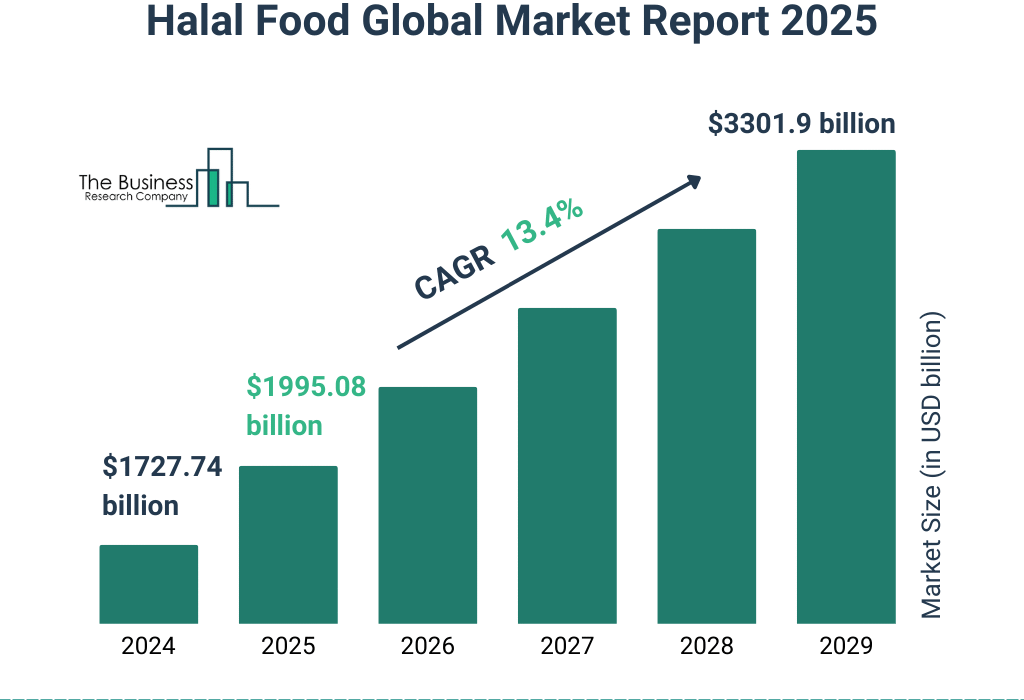Halal certification is increasingly seen as an ethical necessity, not only as a religious obligation but also as a global market brand and standard with a strategic business advantage. Below is a breakdown of how halal certification directly impacts a company’s profitability, market access, and brand value, supported by relevant market data.
EXPANDED MARKET ACCESS
- Global Halal Market Size: Valued at over $2.3 trillion in 2024, expected to reach $3 trillion by 2028 (Dinar Standard & Salaam Gateway).
- Global Halal Market Size: Valued at over $2.3 trillion in 2022, with projections reaching $7.5 trillion by 2032, growing at a CAGR of 12.4% .Allied Market Research
- Muslim Consumers: Over 1.9 billion Muslims globally, with rising middle classes in Southeast Asia, MENA, Sub-Saharan Africa, and Western economies.
- Profit Impact: Certified companies gain access to high-demand markets in countries like Malaysia, Indonesia, UAE, Saudi Arabia, and even non-Muslim majority countries with large halal consumers (e.g., India, UK, France).
- Muslim Consumers: There are over 1.9 billion Muslims globally, with rising middle classes in Southeast Asia, MENA, Sub-Saharan Africa, and Western economies.
- Profit Impact: Certified companies gain access to high-demand markets in countries like Malaysia, Indonesia, UAE, Saudi Arabia, and even non-Muslim majority countries with large halal consumers (e.g., India, UK, France).
SALES GROWTH AND PRODUCT PREFERENCE
- Consumer Preference: A 2023 survey by NielsenIQ showed that 74% of Muslim consumers prefer halal-certified products even if they are costlier.
- Revenue Increase: Food, cosmetics, and pharmaceutical companies report a 10–30% increase in sales post-halal certification due to wider consumer trust.
- Example: Nestlé, the largest halal food producer, operates over 150 halal-certified factories, capturing billions in annual sales from halal markets.
- Example: KFC and McDonald’s have adopted halal menus in certain countries, significantly increasing revenue in Muslim-majority markets.
- In Nigeria, notable national and multinational companies have adopted halal certification and continue to benefit from it for exportation and local consumer trust.

https://www.thebusinessresearchcompany.com/report/halal-food-global-market-report
ENHANCED CONSUMER TRUST AND BRAND LOYALTY
- Halal certification boosts brand credibility, particularly in sensitive sectors like food safety, animal handling, and pharmaceutical ingredients.
- Certified companies gain from repeat purchases, higher customer lifetime value, and increased word-of-mouth marketing in Muslim communities.
Competitive Differentiation & Export Opportunities
- Many countries require halal certification for import, especially in GCC, Malaysia, Indonesia, and some non-Muslim countries with a significant number of Muslim consumers and ethical preference.
- Non-certified businesses are excluded from tenders, procurement programs, and retail chains in regulated markets.
Return on Investment (ROI)
-
- Export premiums: Products may sell at 5–20% higher prices in certified markets.
- Operational integration: Companies gain from improved quality control, documentation, and supply chain transparency.
Halal Industry is an emerging Industry in Nigeria; notable national and multinational companies have embraced halal certification and continue to do so to benefit from it for exportation and boost local consumer trust.

